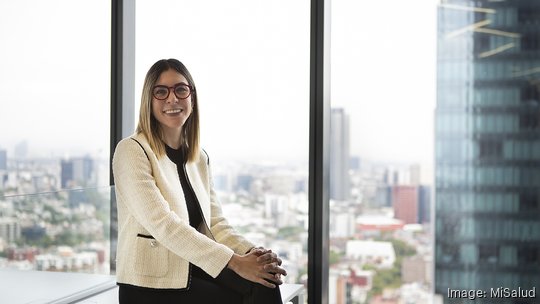
Editor's note: In our 2024 Startups to Watch feature, the Silicon Valley Business Journal and San Francisco Business Times present startups and founders building groundbreaking products and companies in the Bay Area. MiSalud is one of 17 we profiled this year — to read more about our mission and the other startups we're featuring, click here.
When Cindy Blanco first came to the United States from Mexico, navigating health care was complex and daunting. At times she found herself waiting to get medical treatments back in Mexico because it was cheaper and easier to get seen by a physician who understood her language and culture.
That conundrum is why Blanco, along with Wendy Johansson and Bismarck Lepe, founded MiSalud, a Spanish-first bilingual digital health platform, to provide immigrants accessible, culturally-competent health care from a provider who looks and speaks like them.
About MiSalud
- Founded: 2021
- Founders: CEO Cindy Blanco, Wendy Johansson, Bismarck Lepe
- Headquarters: Palo Alto
- Employees: 25
- Total funding: $8 million
"In the U.S. you have to have insurance, you have to find an available primary-care physician and it's difficult for people whose first language might not be English that are not familiar with the U.S. health care system," Blanco said. "And when we're thinking about these industries, people have to cross such a big barrier that prevents them from actually accessing the system."
MiSalud's platform provides users with the ability to access health care from an app by using their phone number. Without requiring users to provide information like a Social Security number, the MiSalud team said, they have been able to see users of all walks of life, though the app is primarily geared towards undocumented and Latinx communities.
Users have access to doctors across the United States and Mexico who are bilingual and who provide treatment services for diabetes, high blood pressure, high cholesterol, family and child care, and generic care. By providing users with access to physicians across Mexico, the company's founders said, it allows migrant workers to continue seeing a care provider even after they have left the U.S.
"Yes, we're Spanish first, but the most important thing is that we think of ourselves as culturally attuned, culturally informed and culturally competent," Blanco said. By having physicians that all have Latinx backgrounds, they can better guide patients on how to navigate diet plans, while not entirely eliminating food like tortillas or pan dulce.
According to a study published in the National Library of Medicine, patients who are not provided with access to a health care provider in the same language are more likely to miscommunicate their symptoms and less likely to comply with medical advice and medications, while also less likely to come to follow-up appointments. According to the U.S. Census Bureau, 70% of the U.S. Latinx population, about 42 million people, speak Spanish at home. However, just 6% of all U.S. physicians speak Spanish.
It's why Blanco said MiSalud are making sure all its providers can communicate in both English and Spanish across California, Texas, Florida and Arizona. The company is looking at expanding its services to New York, Oregon and Washington.
MiSalud is primarily offering its services through employers in the agricultural, hospitality and construction industry because there is a greater number of Latinx workers in those sectors. Those looking to access MiSalud's services without an employer can subscribe at a discounted rate of $240, or 4,499 Mexican pesos, per year.
Johansson said health care is becoming more personalized and that investing in a service that caters to specific linguistic and cultural needs will pay off in the long run.
"There's a lot of different directions we can go and one of those is to look at our model and see how we can translate this to every language and be able to offer that same experience for those underserved populations," Johansson said. "There's at least 10 different languages right now that we could be serving, so for me, I see a lot of features in this whether we go a language direction or otherwise."
Going forward the company is looking to expand its services to include mental health care and find better ways to connect with different migrant communities.



